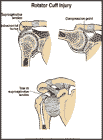
Rotator Cuff Injury
What is a rotator cuff injury?
A rotator cuff injury is a strain or tear in the group of tendons and muscles that hold your shoulder joint together and help move your shoulder.
How does it occur?
A rotator cuff injury may result from:
- using your arm to break a fall
- falling onto your arm
- lifting a heavy object
- use of your shoulder in sports with a repetitive overhead movement, such as swimming, baseball (mainly pitchers), football, and tennis, which gradually strains the tendon
- manual labor such as painting, plastering, raking leaves, or housework.
What are the symptoms?
The symptoms of a torn rotator cuff are:
- arm and shoulder pain
- shoulder weakness
- shoulder tenderness
- loss of shoulder movement, especially overhead.
How is it diagnosed?
Your doctor will perform a physical exam and check your shoulder for pain, tenderness, and loss of motion as you move your arm in all directions. Your doctor also will ask whether your shoulder pain began suddenly or gradually. An x-ray may be done to rule out fractures and bone spurs.
Based on these results, your doctor may order other tests and procedures either right away or later, including:
- magnetic resonance imaging (MRI), which creates images of your shoulder and surrounding structures with sound waves
- an arthrogram, which is an x-ray or MRI that is taken after a special dye has been injected into your shoulder joint to outline its soft structures
- arthroscopy, a surgical procedure in which a small instrument is inserted into your shoulder joint so your doctor can look directly at your rotator cuff.
What is the treatment?
A tendon in your shoulder can be inflamed, partially torn, or completely torn. What is done about it depends on how torn it is and how much it hurts.
If your tear is a minor one, it can be left to heal by itself if it doesn't interfere with your everyday activities. Your treatment plan should include:
- proper sitting posture, in which your head and shoulders are balanced
- rest for your shoulder, which means avoiding strenuous activity and any overhead motion that causes pain
- ice packs at least once a day, and preferably two or three times a day
- doing the exercises your doctor gives you
- anti-inflammatory drugs
- physical therapy to strengthen your shoulder as it heals.
If you have a bad tear, you may need to have it repaired by arthroscopy. Arthroscopy is also used to perform surgery on a joint, not only for seeing its interior. The rough edges of a torn tendon can be trimmed and left to heal. Larger tears can be stitched back together. After surgery, your treatment plan will include physical therapy to strengthen your shoulder as it heals.
How long will the effects of a torn rotator cuff last?
Full recovery depends on what is torn and how it is treated.
When can I return to my sport or activity?
The goal of rehabilitation is to return you to your sport or activity as soon as is safely possible. If you return too soon you may worsen your injury, which could lead to permanent damage. Everyone recovers from injury at a different rate. Return to your sport or activity will be determined by how soon your shoulder recovers, not by how many days or weeks it has been since your injury occurred. In general, the longer you have symptoms before you start treatment, the longer it takes to get better.
You may safely return to your sport or activity when:
- Your injured shoulder has full range of motion without pain.
- Your injured shoulder has regained normal strength compared to the uninjured shoulder.
In throwing sports, you must gradually build your tolerance to throwing. This means you should start with gentle tossing and gradually throw harder. In contact sports, your shoulder must not be tender to touch and contact should progress from minimal contact to harder contact.
What can be done to help prevent this from recurring?
The best way to prevent a recurrence is to strengthen your shoulder muscles and keep them in peak condition with shoulder exercises.

